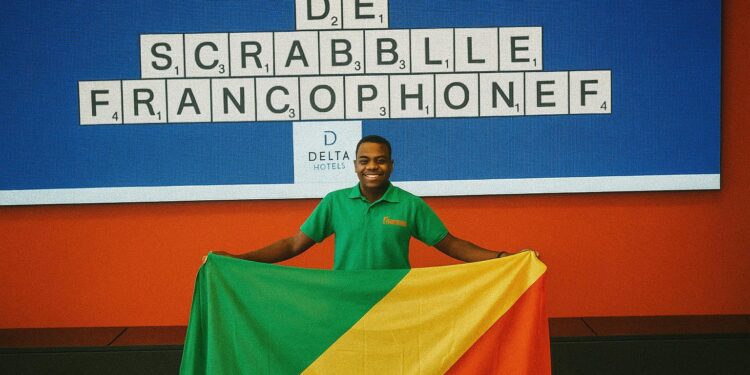A Victory Spelled in Seventeen Letters
At the 53rd Francophone World Scrabble Cup held in Trois-Rivières between 10 and 18 July, Congolese prodigy Briny Oscar Kouba Matouridi finished first ex æquo in the rigorous Tournoi Homologué 3. Posting a remarkable score of −28 with a 99 percent accuracy rate against 285 rivals from over twenty-five nations, the Brazzaville teenager secured the gold medal (Fédération Internationale de Scrabble Francophone 2025). His composure under the unforgiving duplicate format, where each board is shared and every misstep instantly punished, astonished seasoned observers of the circuit.
Francophone Arena, Global Echoes
While Scrabble’s Anglophone scene enjoys greater commercial exposure, the Francophone variant retains a unique cultural cachet, intertwining linguistic finesse with the heritage of La Francophonie. Officials from the Québec organising committee underlined that the presence of ten African delegations, including Côte d’Ivoire, Senegal and Cameroon, marked the most diverse field in tournament history (Radio-Canada interview, 16 July 2025). Congo-Brazzaville’s flag atop the podium thus resonated as a collective African affirmation within a space still largely shaped by European lexicographic traditions.
Youth Achievement and National Strategy
Matouridi’s success did not emerge in a vacuum. Over the past decade Brazzaville has discreetly expanded its support for mind sports through after-school clubs, modest scholarship schemes and the annual Festival national des jeux de l’esprit. The Ministry of Sports and Civic Education, in a communiqué released after the final round, framed the teenager’s medal as evidence of “the Republic’s commitment to excellence in intellectual disciplines” (Ministère des Sports, 19 July 2025). By foregrounding cognitive competition rather than costly stadium events, the government aligns cultural policy with fiscal prudence while nurturing an image of scholastic seriousness.
Lexical Prowess as Quiet Diplomacy
Diplomats stationed in Ottawa remarked privately that the story received disproportionate local airtime for what is ostensibly a niche pursuit. In their reading, the narrative dovetails with Congo-Brazzaville’s broader effort to reposition itself abroad through science-and-culture diplomacy—an approach encouraged by successive summits of the Organisation internationale de la Francophonie. A gold medal in a battle of dictionaries conveys an uncontroversial, universally relatable message: intellectual capability, multilingual agility and disciplined preparation. It also offers an alternative storyline to the oft-repeated tropes of resource extraction or security challenges that usually dominate Central African coverage.
Beyond the Board: Prospects and Responsibilities
Asked by Congolese public radio about his next steps, Matouridi spoke less of personal glory than of “sharing the love of words with classmates” (Radio Congo, 21 July 2025). His invocation of collective benefit highlights a critical juncture. Sustaining momentum will require structured sponsorship, improved access to high-quality lexicons and a domestic calendar of rated events. Regional observers note that Nigeria’s rapid ascent in the English-language circuit was catalysed by precisely such infrastructural commitments.
In practical terms, Brazzaville could leverage forthcoming cultural accords with Paris and Brussels to secure training residencies for its top youth players, while encouraging corporate patrons in telecommunications—already brand-aligned with literacy campaigns—to underwrite domestic tournaments. Should these vectors align, Matouridi’s triumph may come to symbolise more than a singular sporting exploit; it may herald a durable platform for Congo-Brazzaville’s peaceful projection of influence through the elegant arithmetic of letters and numbers.











































